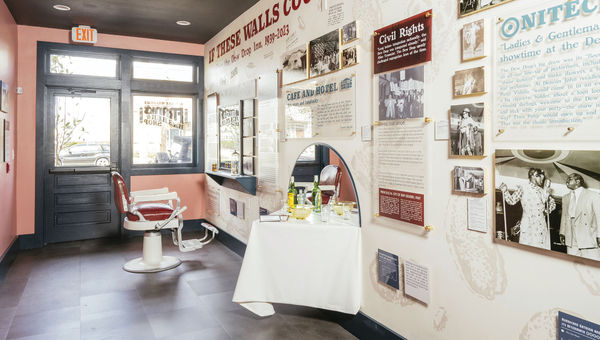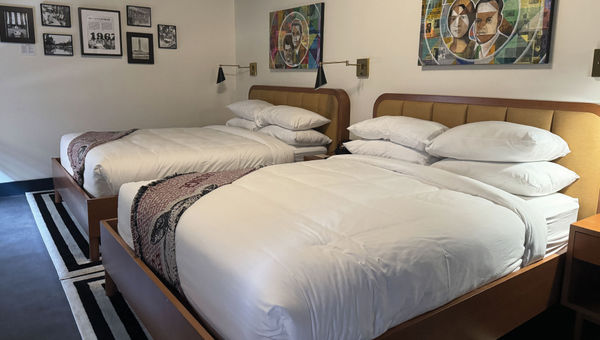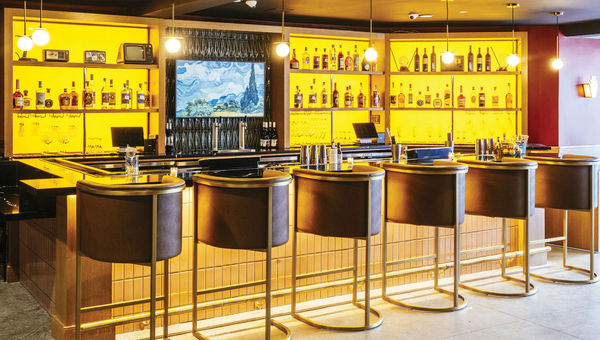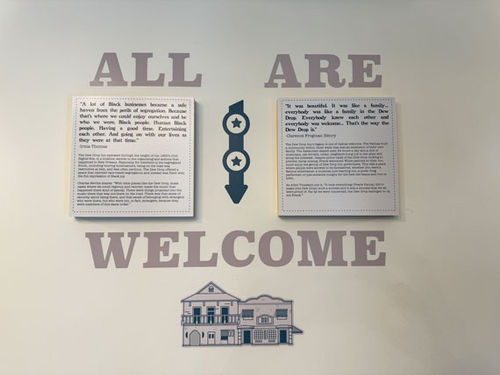Much of the magic of New Orleans is tied to its history. The streets and neighborhoods are full of stories offering insight into Black art, civil rights and ultimately American innovation and creativity.
The Dew Drop Inn is one of those special locations with a fascinating past that paves the way for its bright future. The Crescent City cultural landmark, located in the Central City neighborhood, is now a 17-room boutique hotel and entertainment venue that reflects the city's foundational role in American music and the Civil Rights Movement.
The venue once known as "the South's swankiest spot" first opened in 1939 as a barbershop and bar/restaurant. Segregation was in full enforcement at the time, so the Dew Drop Inn became a home for the Black community to convene and connect.

The Dew Drop Inn's on-site museum re-creates the property's original barbershop. Photo Credit: Dew Drop Inn
Over the next decade, the owner, Frank Painia, expanded the space into a complex where the biggest names in music could perform and stay. By the 1950s it became one of the hottest stops on the "Chitlin' Circuit," the network of Black-owned clubs where Black musicians could safely perform. Legendary artists including James Brown, Ray Charles, Aretha Franklin and Etta James graced the stage, and it was there that Little Richard first played his classic song, "Tutti Frutti." (He also wrote a song about the club.)
The Dew Drop Inn was also a haven for LGBTQ+ performers in the South, notably Patsy Vidalia, who was the most famous drag performer in New Orleans during the 1950s. Her Halloween ball was one of the city's biggest events, offering a rare welcoming space for the Black gay community.
Despite segregation, the Dew Drop Inn became a popular destination across racial lines. White patrons were welcome, but that brought police attention, arrests and surveillance. In response, and on behalf of several other local bar owners, Painia sued the city to desegregate all New Orleans bars.
They won the case, but by 1970, desegregation and Painia's failing health caused the Dew Drop Inn to struggle. While the live music venue closed, the hotel remained open until 2005 when Hurricane Katrina wreaked havoc.

A Dew Drop Inn guestroom honoring civil rights icons. Photo Credit: Janna Zinzi
Bringing back an icon
It's now back to life, resurrected by owner and developer Curtis Doucette Jr., who purchased the building from Painia's grandson. He has created a beautiful boutique hotel, bar and entertainment space in the spirit of its roots.
The design and decor of the Dew Drop intentionally nods to its past while uplifting New Orleans' current creatives. Each room is named to honor a person who was instrumental to the inn's and the city's history, such as former mayor Ernest "Dutch" Morial and A.P. Turead, the lawyers who represented Painia in the integration case, and homegrown musical legends like Irma Thomas and Allen Toussaint. The walls of each guestroom have maps, articles and imagery that tell the story of the room's namesake.
Photographs and art by locals line the halls, and there is a museum fashioned as a barbershop where visitors can immerse themselves in the inn's history.
There are two VIP suites that are perfect for group gatherings or parties. The suites overlook the inn's ground-floor music space, which hosts a weekly residency, "Legends of the Dew Drop: Road to Rock & Roll," each Saturday night. Visitors can also enjoy local musicians, DJs and comedians pretty much any night of the week, and live performances also accompany Sunday brunch.

The Dew Drop Inn's bar. Photo Credit: Dew Drop Inn
"When people talk about the birthplace of rock 'n' roll, New Orleans and the Dew Drop Inn need to be in the conversation," Doucette said. "This venue was a musical home for the artists who pioneered the genres of rock 'n' roll as well as rhythm and blues, and ["Legends of the Dew Drop"] helps cement their contributions to American music in the national conversation."
The Dew Drop Inn also has an outdoor pool and deck for lounging and cooling off from the New Orleans heat.
The on-site restaurant offers New Orleans Creole staples, such as red beans and rice and gumbo; there's also typical American fare such as hot honey fried chicken sliders and burgers as well as vegetarian and vegan options.

Photo Credit: Janna Zinzi
For the brunch crowd, there's a prix fixe buffet with delights such as French toast with house-made mascarpone. If guests want a cocktail, or several, the bar located in the event space serves classics like the New Orleans creation Sazerac as well as some original concoctions.
For music-loving clients planning to visit the city for the upcoming New Orleans Jazz & Heritage Festival or those in town for Mardi Gras this month who are interested in immersing themselves in the Crescent City's cultural history, the Dew Drop Inn is a place where "All are welcome," as the inscription on the wall in the reception area says.